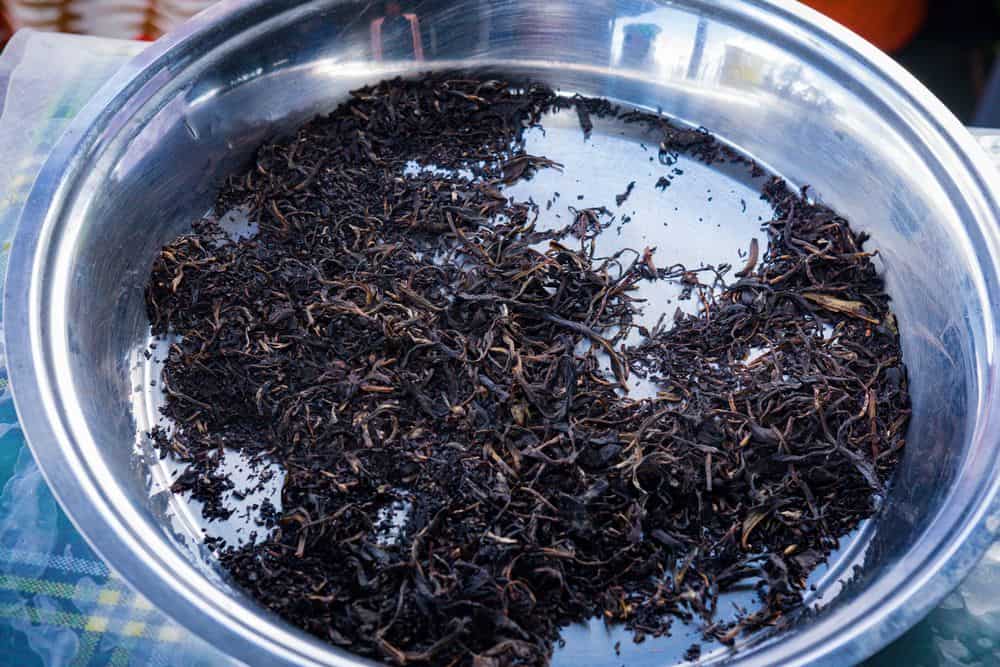 I drink a lot of tea.
I drink a lot of tea.
At times, it does make my mouth feel a little dry.
But generally, I don’t notice this issue.
However, everyone reacts differently to some of the components in tea. And there are many different kinds of tea.
Getting a bit of dry mouth from drinking tea is not unusual.
But what causes this? Why does tea make my mouth dry?
It actually comes down to a specific component in the tea. One that is responsible for some of tea’s most sought-after health benefits, in fact.
keep reading to learn exactly why tea can cause your mouth to feel dry after drinking it. We’ll cover everything you need to know, including steps you can take to avoid this problem going forward.
Table of Contents
Why Does Tea Make My Mouth Dry?
Tea makes your mouth dry because of the presence of tannins. Tea, coffee, wine, beer, and other drinks contain a substance called “tannins.” Tannins have an astringent, or drying, quality.
Since tea contains a high number of tannins, your mouth can feel dry after drinking it. Tannins bind to proteins on the tongue and cheek surfaces, so they can both feel dry after consuming tea. Let’s find out what these tannins are exactly.
What Are Tannins?

Tannin compounds are widely found in many species of plants, where they play a role in protection from predation (acting as pesticides) and are also thought to help in regulating the growth of plants.
They lend bitter flavors and an astringent quality to many drinks, including tea. Tannins are a type of polyphenol (compounds found in plant-based foods that act as antioxidants) and contribute to the health benefits, flavor, and color of tea.
Polyphenols, including tannins, have various health benefits due to their antioxidant and anti-inflammatory properties. However, there is also some scientific evidence that suggests that tea tannins have been shown to have a number of potential negative effects on the body.
These effects include reducing the absorption of nutrients, interfering with the absorption of medications, and contributing to gastrointestinal problems. These negative effects are usually associated with overconsumption of tea, though. They should not stop you from enjoying your morning cup.
Do All Teas Contain Tannins?
All true teas are produced from the leaves of the tea plant, Camellia sinensis, and they all contain tannins. The different types of tea produced from Camellia sinensis leaves—black, green, white, yellow, oolong, or pu’er—all contain tannins in different quantities, depending on the variety, processing methods, and growing conditions.
You tend to find higher tannin levels in fast-growing tea plants, due to the role that tannins play in growth regulation. It is also believed that tea plants that grow at a higher altitude are prone to containing larger quantities of tannins.
Of the true teas, black tea has the highest tannin concentrations, ranging from 11 to 15 percent, while green tea has the lowest amount of tannins, with between two and three percent.
Our article comparing black tea vs green tea has much more on the differences between the two. Oolong tea falls in the middle of black and green tea, averaging around eight percent.
Herbal teas often do not contain tannins, since they are not made from Camellia sinensis leaves. Herbal teas are made by steeping herbs, spices, and fruits in hot water. Some herbal teas may contain tannins, but this would come from the addition of other tannin-bearing ingredients, such as blackberry leaves or hibiscus flowers.
Health Benefits Of Tannins

While tannins often get bad press for their potential negative effects as polyphenols, there are also some potential health benefits from including tannins in your diet. The main benefit to your health from tannins is their antioxidant effect, which may help prevent heart disease.
Tannins are also helpful in combating inflammation and may help prevent cancer by reducing the risk of cellular damage and cell mutation.
Potential Health Drawbacks Of Tannins
However, tannins do have anti-nutrient properties, meaning they interfere with the digestion and absorption of some nutrients, particularly iron. For most people this will not pose a serious risk, especially when drinking tea in moderation.
However, some people’s bodies take up iron in a less efficient way than others. And in some cases, excessive tannin consumption can lead to iron deficiency anemia.
Tannins have also been reported to have a potential negative effect on digestion and may cause nausea and gastrointestinal issues in some people.
How To Combat A Dry Mouth

If you often experience a dry mouth after drinking tea, there are a few steps you can take in order to reduce this effect. The most obvious way to reduce the feeling of a dry mouth from tannins is to reduce your tea consumption.
But that is not what we are looking to do here. If you need your cups of tea throughout the day, there are some ways to offset the effects of the tannins.
First, check the quality and type of tea you are drinking. You may find that switching to a different type with lower tannin levels can help reduce the problem. Oolong tea or white tea may be suitable substitutes for your current tea, because they tend to have lower tannin levels.
Adding milk or lemon to your tea can also help reduce the potential negative effects. These additions can bind to tannins, reducing their effects.
Other ways to reduce the dry-mouth effect of tannins include steeping your tea for shorter periods of time, so fewer tannins can seep into your drink; reducing the amount of tea you use to make each cup; and increasing the amount of water in relation to the amount of tea you use.
Why Does Tea Dry My Mouth: Related Questions
Next, we will answer some additional questions about the tannins in tea and their side effect of causing dry mouth. If you have any other questions, feel free to ask them in a comment below.

Are There Tannins In Ginger Tea?
Ginger doesn’t contain any tannins. However, it may be blended with other ingredients which do contain tannins, such as black tea.
Are There Tannins In Peppermint Tea?
Peppermint itself does contain tannins. It also contains calcium, iron, magnesium, phosphorus, potassium, and vitamins A, B-complex, and C. Therefore, a cup of tea made with peppermint will also contain some tannins.
Does Rooibos Tea Contain Tannins?
Rooibos tea is a herbal infusion and not a true tea that uses leaves from the Camellia sinensis plant, as black tea does. Rooibos does naturally contain tannins, but at a lower level than true tea does. The tannin content in Rooibos is typically around 4%.
What does rooibos tea taste like? It actually tastes quite similar to black tea, so much so that many can’t even tell the difference. That is why it makes a great alternative for anyone looking to avoid tannins. Or caffeine.
Note that there is a difference between red and green rooibos teas. Red is far more common, but green is another option, especially if you are looking for a lower tannin content, or a milder flavor.
Does Chamomile Tea Have Tannins?
Chamomile tea has a low concentration of tannins. The tannin level in chamomile tea is less than one percent. Chamomile tea is a herbal infusion made by infusing hot water with dried flowers. Two types of chamomile flowers are used: German chamomile (Matricaria recutita) and Roman chamomile (Chamaemelum nobile).
Tea Makes My Mouth Dry: Final Thoughts
Most people don’t get a dry mouth from tea most of the time. But it is also not all that unusual for tea to make your mouth dry, due to the tannins. It happens to me occasionally, too.
In the end, it depends on a lot of factors. One of those factors is the type of tea. That means you can switch to a different type with fewer tannins and you may no longer have this issue. You can also brew your tea with fewer leaves and/or shorten the steeping time. Adding milk or lemon to your tea can help as well.
Leave a Reply